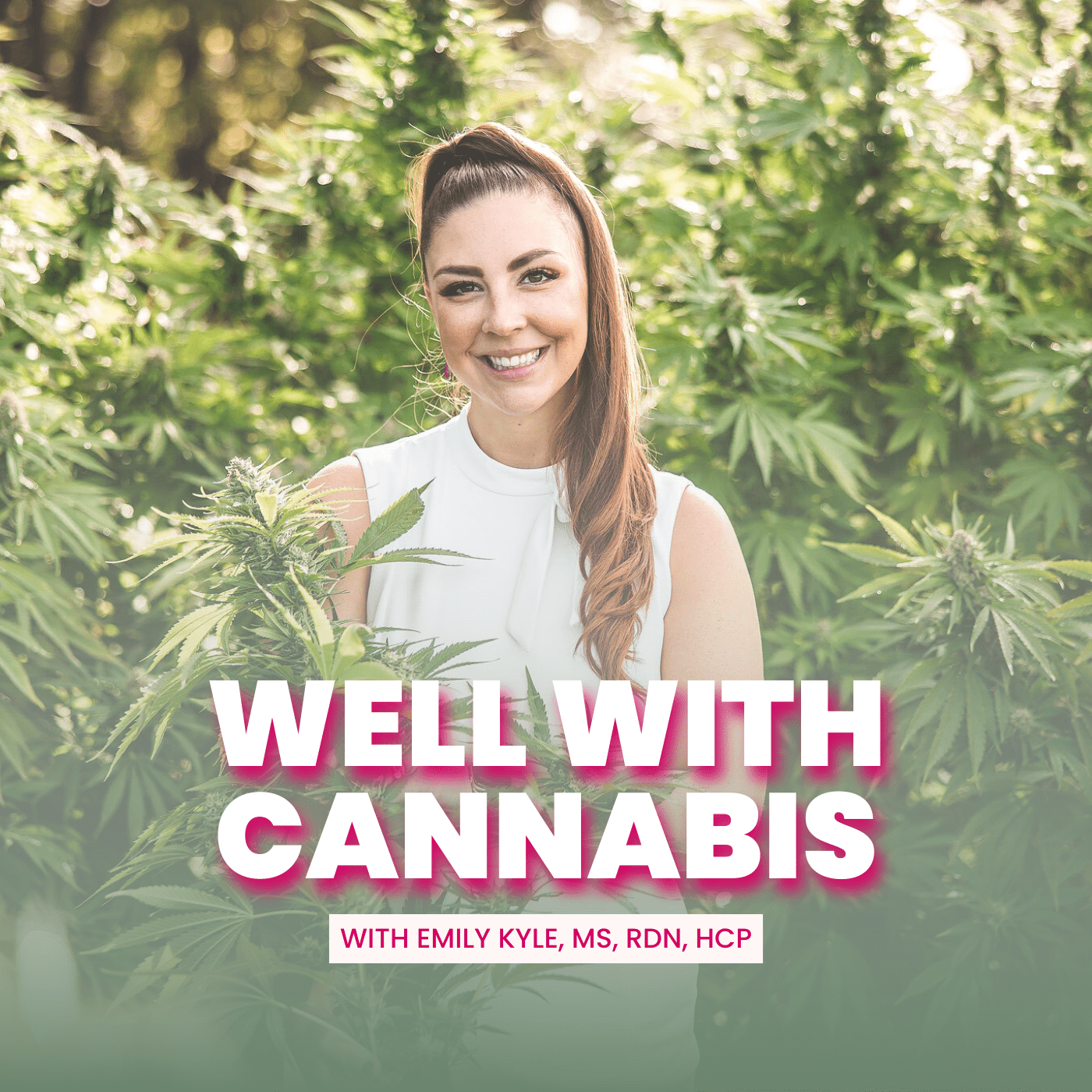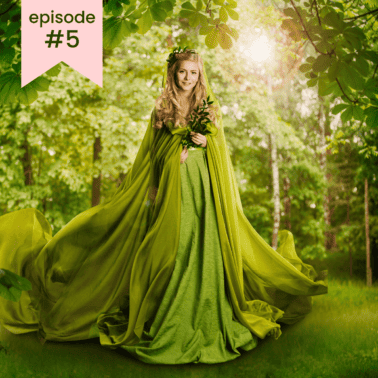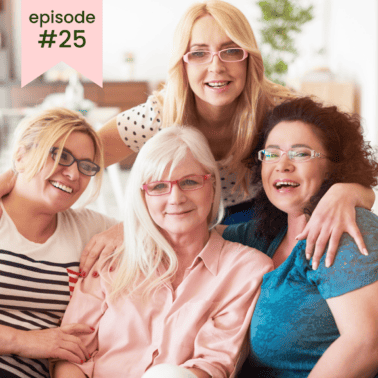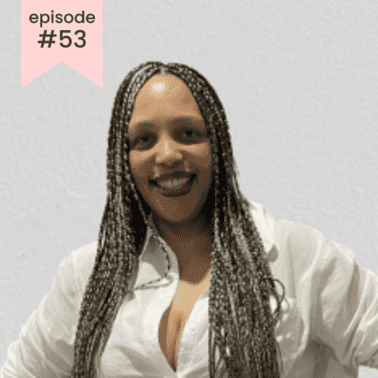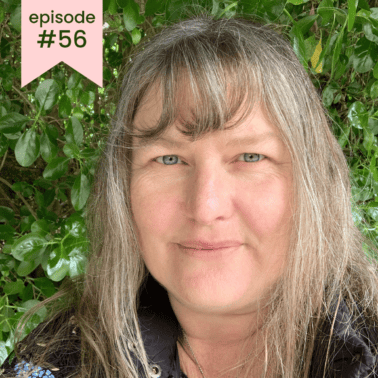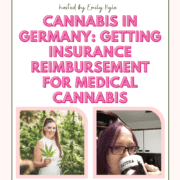This week, get to know Laura Ntoumanis, a remarkable woman living in Germany who has turned her personal journey with chronic pain into a beacon of hope for others. Get ready to learn, empathize, and be moved as she shares a story of resilience, discovery, and positive change.
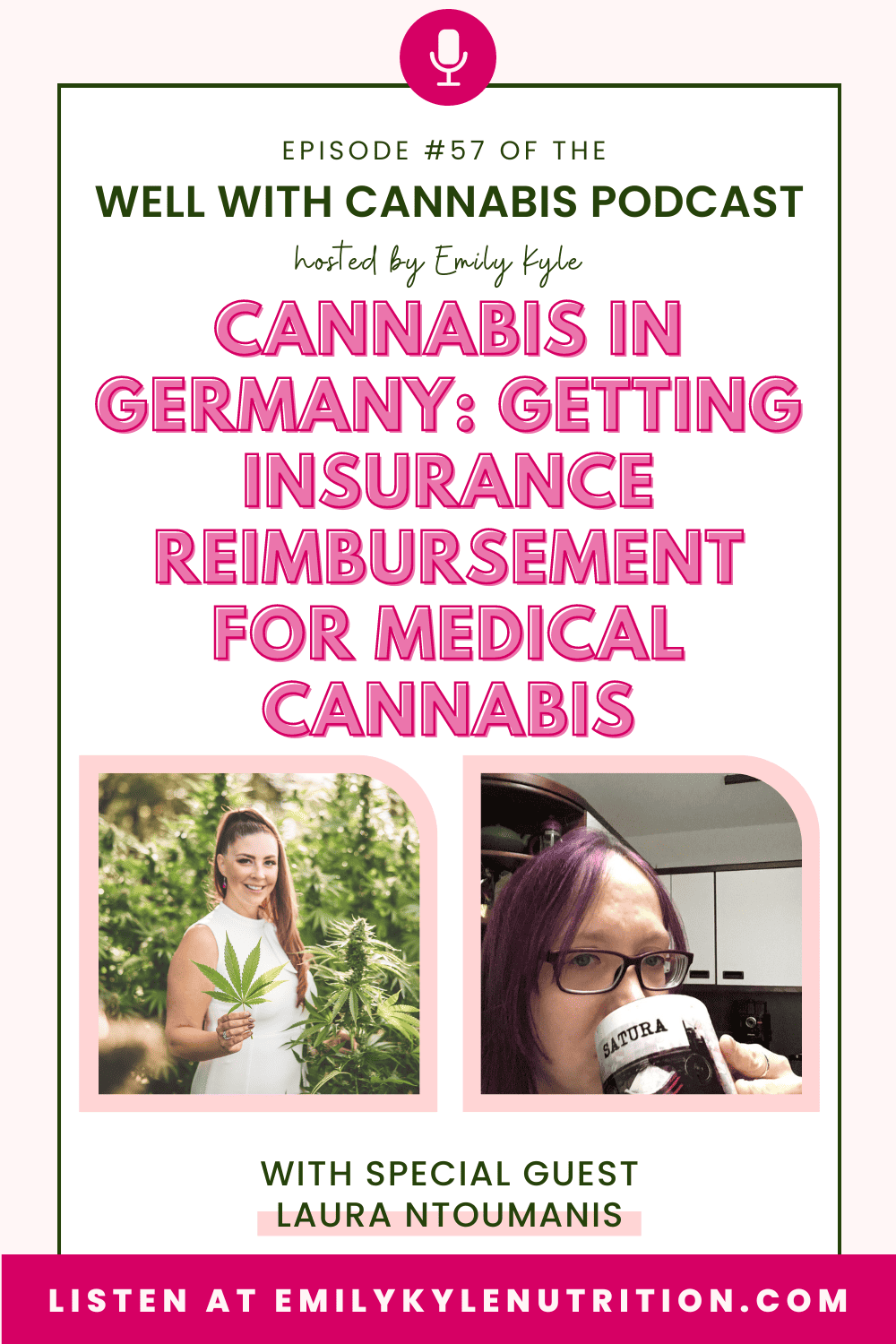
Table of Contents
Features
- Release Date: Wednesday, October 11, 2023
- Episode Number: Season 1, Episode 57
- Special Guest: Laura Ntoumanis, co-host of the Biblio Banter podcast
Listen To The Episode
Click the play button above to listen to the episode.
Listen to all podcast episodes →
Why You Will Love This Episode
This week’s inspiring guest is Laura Ntoumanis, who has been dealing with chronic illness for nearly five decades.
Navigating the challenges of chronic pain, Laura’s journey led her to medical cannabis after opioids had detrimental effects on her mental health.
After years of suffering, Laura discovered medical cannabis as an alternative treatment in Germany. Her life took a dramatic turn for the better, and she no longer needed opioids for pain management.
She continues to explore new ways to consume cannabis, seeking the perfect balance to manage her pain without tipping her over the edge. It’s a tricky line to tread, and Laura offers some invaluable insights from her experiences.
One of the most intriguing parts of Laura’s story is her ability to get insurance reimbursement for her medical cannabis in Germany.
This episode sheds light on this process, providing a beacon of hope for those seeking similar paths.
Related Episodes
Podcast Episodes
Meet the Cannabis Green Fairies of New Zealand
Podcast Episodes
Discovering the Healing Power of Cannabis for Pets & People
Full Transcript
Laura: My life has really become enriched, and I attribute cannabis to a big part of that because it changed my whole viewpoint. It changed where I was and how I felt in life.
Announcer: Welcome to the Well With Cannabis Podcast, a show dedicated to telling the life-changing stories of those who live well with cannabis all while teaching you how to do the same. Meet your host, Emily Kyle, a registered dietitian nutritionist turned certified holistic cannabis practitioner. Emily changed her life for the better with the help of the cannabis plant, and now she’s committed to helping others do the same.
Tune in each week to hear heartwarming stories and gain the knowledge you need to feel connected, inspired, and supported on your own cannabis journey. Whether you’re a new cannabis consumer or a lifetime lover, you’ll benefit from these uplifting tales of real-life journeys that will show you how you, too, can live your best life well with cannabis.
Disclaimer: Hi there. Before we jump into today’s episode, I wanted to share a note on potentially sensitive content. The episodes on the Well With Cannabis Podcast are created for adult audiences only. We will, at times, cover sensitive topics, including but not limited to suicide, abuse, mental illness, sex, drugs, alcohol, psychedelics, and the obvious use of plant medicine. Explicit language may be used occasionally. Please refrain from watching or listening to the show if you’re likely to be offended or adversely impacted by any of these topics.
The information on this show is for informational and educational purposes only. It does not constitute medical advice. If any of the content on this podcast has brought up anything for you, please reach out or speak to a professional or someone you trust.
Emily: Hello, and welcome back to another episode of the Well With Cannabis Podcast. I am very excited to introduce you to Laura coming all the way from Germany. Laura, welcome. Thank you so much for joining us today
Laura: Thank you for having me.
Emily: You have battled with a chronic illness for a very long time and have been recently introduced to cannabis. I’d love to hear your story about how that has evolved for you.
Laura: Actually, I had an introduction to cannabis back about 30-ish years ago in college on a party level. I noticed then that it was really good for pain, much better than a lot of the opioid painkillers they were giving me. But, of course, it wasn’t legal at the time. And then, when I moved to Germany, after two hip surgeries and lots of pain and lots of opioids, they legalized marijuana for medical use here. I was fortunate enough to have doctors who were very supportive in having me try it out in lieu of opioids, so I started taking cannabis for pain, and it’s really changed my life over the past five years. That’s the short version of the story.
Emily: That’s the short version. First, were you in the U.S. before coming to Germany? Or have you always been where you were originally located?
Laura: I was initially in the US, and then I moved to Greece for a few years. My husband’s Greek, so I lived there for a few years, and then he took a job here in Germany, and we came to Germany.
Emily: Awesome. How do you like it there?
Laura: It’s enjoyable. I love it here. It’s great.
Emily: Oh, that’s so fun. I’d love to talk a little bit about what legalization looks like. You said they legalized medicinal cannabis. Is it similar to here in the States? And what does it look like for recreation as well?
Laura: I think the different states in Germany have different rules as far as how much you’ll get busted for. I think a certain level is tolerated, but it’s not legalized for personal use.
Laura: For medical use, it’s a little bit different than in the US in that you get it through pharmacies, regular pharmacies here, and you can get it by prescription. You have to get it by prescription to get it that way. And it can be through the insurance company, so it’s paid for if you fight and say there’s a good reason this patient needs it. And it took me, I think, about a year and a half and a bit of a fight to get it covered under my insurance.
Emily: Wow. That’s not heard of in the States. That’s very progressive. That’s amazing. So, how are your doctors with all of this? You said they were pretty supportive.
Laura: Yeah, my orthopedist, who’s the one that’s really been working with my case the closest, because I had, over 20 years, two broken hips. I couldn’t get them operated on in the US because it was considered an elective surgery so insurance wouldn’t pay for it.
Laura: And then in Greece, they said, “You’re young, let’s wait.” When I came here, the orthopedists were shocked by my hips’ state. My left hip has been broken four times, so I walked around on bad hips. Even after the surgery, when I could walk, move, and do many things I couldn’t do before, I was still in much pain. I was on opioids, and I wasn’t functioning. I call myself a ghost when I’m on them. From the time I was in Greece to here, I was on a lot of opioids, I was in a lot of pain, and I wasn’t really a productive person. It was pretty terrible, and I was miserable. I think it was changing my personality.
Laura: When medicinal cannabis came out, I asked my orthopedist what he thought about it. He said he would certainly support it. Not so many doctors were giving prescriptions for it because there’s a weird system here. I don’t know exactly how it works, but they have a specific limit to how many prescriptions they can give and how much they’re for. So, I had to go to a doctor who was willing to do cannabis prescriptions. He backed me and fought for me and my psychiatrist to get the insurance to pay for it.
Emily: That’s amazing. I’m so happy to hear that. The medical system over there seems a little bit more progressive than most.
Laura: Yeah, I think it’s a sound system because all the, there are many types of different cannabis you can get through the medical system, and I think it’s regulated. You know precisely what you’re getting and what it is, and the government knows. I think that makes it a little better because you have all these types, you know what it is. It’s better.
Emily: What is the culture like? Are people ready for medical marijuana? Are they ready for recreational marijuana? Is it similar to the States, where the people are ready for it? Or are people not quite there yet?
Laura: I think people are ready. I’m not sure what the last poll was, but I know the current government is really looking at legalization entirely. And because of our proximity to the Netherlands, there’s a lot of cross traffic from that. I think, in general, Germany is indeed open. I think a lot of European countries are pretty open about it.
Emily: Oh my gosh, that’s amazing to hear. I feel like it’s truly a global movement at this point. I talked to someone in South Africa and Australia, and it seems everybody is coming. We’re here, and I’m so happy to hear that’s also coming for you. You are the first person I’ve ever heard of insurance covering cannabis, and that is so exciting for the future if we could get that; oh my gosh.
Laura: Yeah.
Emily: I’d love to transition a bit if you’re willing to talk about the difference you have seen in your life with opiates versus cannabis. So many people listening deal with chronic pain and may or may not have already tried cannabis. They might still be on the prescription medications and looking to make a change.
Emily: What can you describe as the change you’ve experienced for the transition?
Laura: I think one of the problems I had with opioids is they really changed my personality quite a lot. For a long time, I tried not to take them daily, so my pain wasn’t being managed. When you’re in severe pain, you need to take something regularly, which was a problem for me. I didn’t realize that opioids can be a known factor in depression and your mood. It can really affect people this way and all the chemicals and things in it.
Laura: I don’t know. I just don’t find it to be a very good thing. And also the way it can make people addicted, I think, is a very bad factor of it. I tried CBD, and after a few weeks, I noticed that I had headaches and was really stressed. That was weird. So, I did what I always do in my life with new medications. I take things out and see if this is making a difference. And it turns out. That I was being affected by CBD in a negative way, which really surprised me. The doctor said he had heard that that could happen. So CBD isn’t always perfect for everyone.
Laura: So I tried some THC strains that didn’t have very much CBD in them, and that seemed to work better. Finding the right strain that will work for you takes some time. You can’t just assume that because you had a bad experience with one strain, you should be done with cannabis. It’s like any medication. There are lots of different strains, and you just have to stick with it and try.
Emily: Oh, my gosh, that’s excellent advice for so many of us. It’s trial and error. We’re used to the prescription medications where they give you a pill, and that’s it. Whereas cannabis, there are thousands of strains and different ways to try it. There are so many options, and it can feel overwhelming at first. Do you remember the first time you tried cannabis again later on in life? Was it a good experience for you?
Laura: Yeah, definitely. It remained a good experience. I have had situations where I’ve had too much, especially with edibles, and my experience with that is I just get so annoyed because I know it’s too much, and I have just to wonder when it will stop, and I can get back to normal. But really, it’s been a good experience for me.
Emily: Oh, I’m so glad. If you could give advice to someone listening who is currently taking opiates or any type of prescription medication for pain and they’re thinking about cannabis but they’re not sure about making that leap, what advice do you have for them?
Laura: I would say give it a try because, to me, opioids are a prison, and I feel like with cannabis, you can moderate amounts. With a pill, it is what it is. So if your pain isn’t as bad, you can’t take less. You can’t; it’s one thing. With cannabis, you can have smaller doses, more significant doses, and you can adjust it as your day goes along, and I think that makes a big difference in pain management.
Emily: Absolutely. I always ask my guests all the same four questions. Are you ready to start them?
Laura: Okay.
Emily: The first one is, what are you most proud of in your life, whether cannabis-related or not?
Laura: I’m most proud of the fact that cannabis has allowed me to go back to school for a Master’s.
Emily: Congratulations! That’s amazing!
Laura: That’s been great. I’ve co-founded a literary journal at our university. I’ve done lots of research and been presenting my work at different conferences around the world. My life has really become enriched, and I attribute cannabis to a big part of that because it just changed my whole point of view. It changed where I was and how I felt in life. So that was a big difference for me.
Emily: That’s amazing. Congratulations on all of these things. It’s so exciting for the future. That leads us to our next question, which is always everyone’s least favorite question. What do you think your life would look like without cannabis?
Laura: I hate to think of that because, I think before it was legalized here, I was always trying to take as few opioids as possible and still manage my pain. I was doing a lot of exercises, rehabilitation classes, physical therapy, and taking walks. This in itself is not enough for pain management. I think I really wouldn’t have found myself at an older age and found joy in my life without it.
Emily: I’m glad that you have it. If you could go back 10, 20, or 30 years ago and give yourself a piece of advice, cannabis-related or not, what would it be?
Laura: Dive in, always try things. Don’t try things because of fear. I think that not trying causes more regret than trying and failing because failing teaches you something.
Emily: Absolutely. Last question: if you could be remembered for just one thing, whether it’s the cannabis space or not, what would it be?
Laura: I think giving students a space here to share their work creatively and academically. This journal that we started is really what I’d like to be remembered for. I think in Germany, it’s not so common to have literary journals in universities. And I am really happy to give students a way to express themselves and show who they are somewhere other than social media.
Emily: Oh, my gosh, that’s beautiful. That’s so exciting. Thank you so much for sharing your experience with cannabis with us today. Do you have any last words of wisdom for our listeners?
Laura: Give it a try. Don’t be scared. Get advice where you can get advice. The Emily Kyle website is a really great place to start. Keep trying, and hopefully you’ll find something you like that works.
Emily: That is perfect. Thank you so much for coming literally from across the world to share with us your experiences with cannabis, what cannabis looks like in Germany, and just giving us a bigger worldview. We really appreciate it.
Laura: Thank you.
Announcer: Congratulations, you’ve finished another episode of the Well With Cannabis Podcast and are one step closer to discovering how you, too, can live well with cannabis.
Thank you for listening in today. We hope this episode has been a helpful and informative one. Please visit emilykylenutrition.com for more information on today’s show, show notes, guest information, recipes, and other resources.
If you want more support and encouragement on your cannabis journey, please consider joining the private Well With Cannabis Community. In this group, you can connect with like-minded individuals focused on improving their health and wellness through cannabis.
Join the group today to continue your journey of wellness together!
